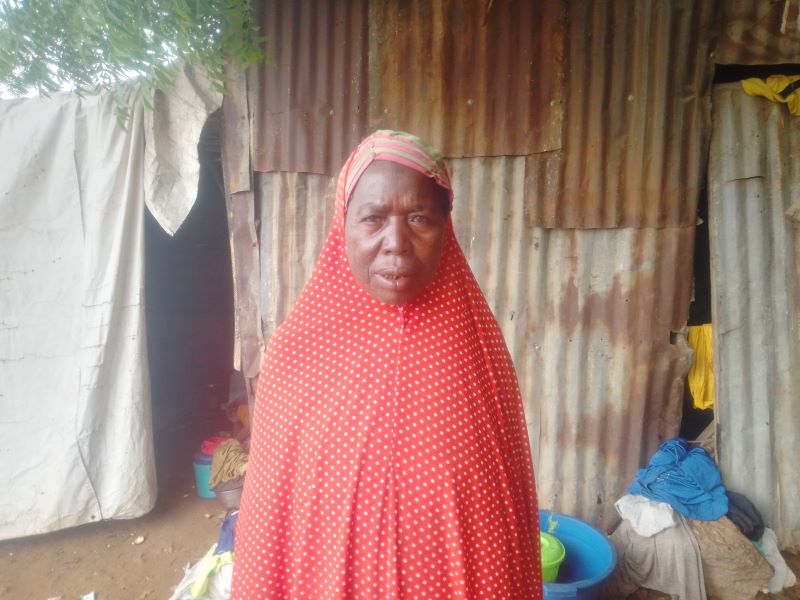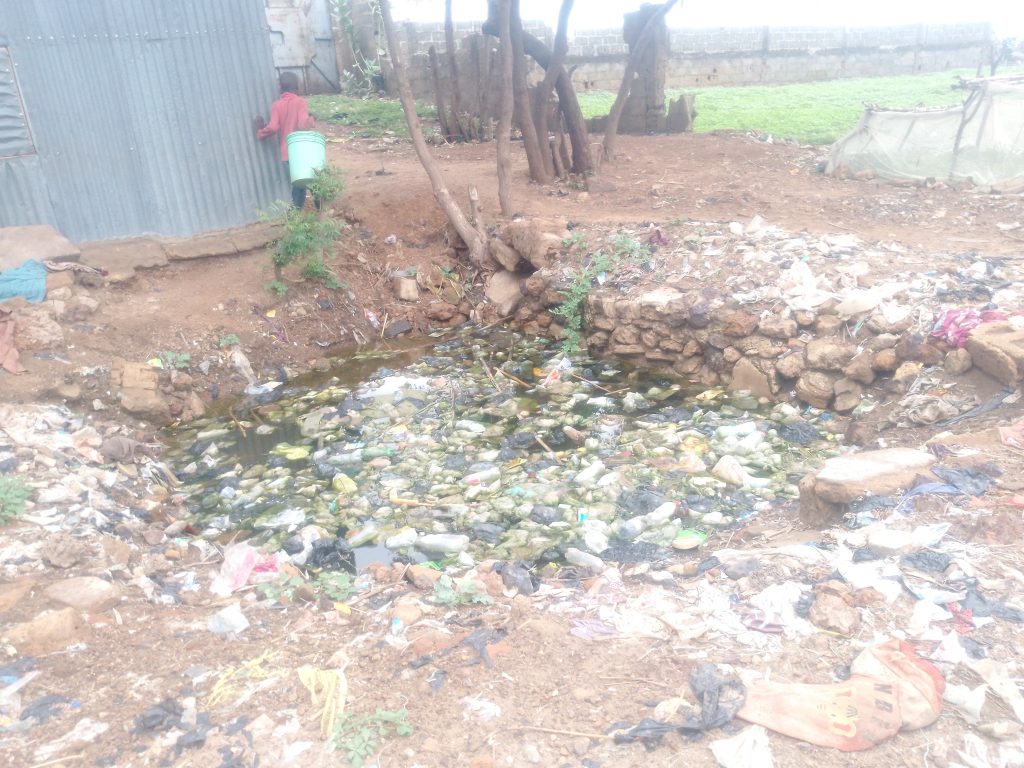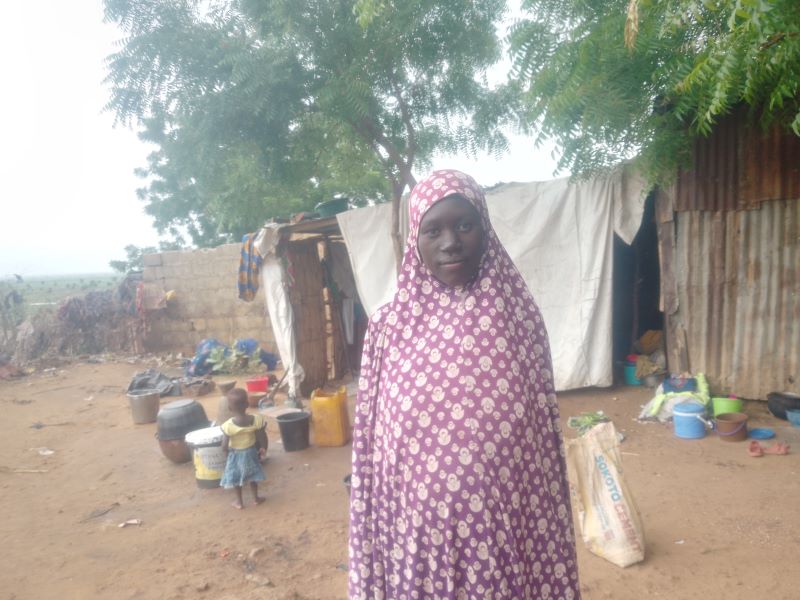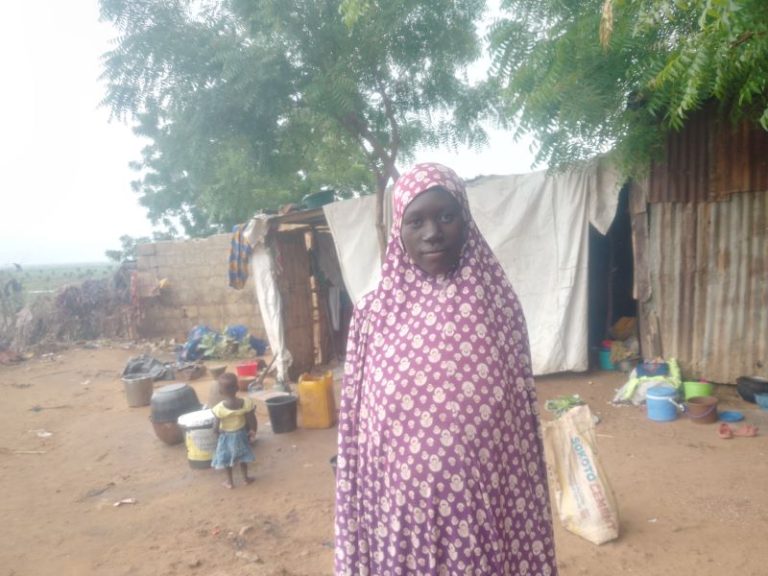With 94,729 Internally Displaced Persons (IDPs), Sokoto accounts for 9% of the total number of IDPs in Nigeria, according to the Displacement Tracking Matrix (DTM) IDPs Atlas. These individuals, hailing from various parts of the state, have been forced to flee their homes due to conflict, insecurity, and hardship.
By Shafa’atu Suleiman
As the camps struggle to cope with the sheer scale of the crisis, concerns are mounting over the provision of basic necessities like food, water, shelter, environmental hygiene, and healthcare.
Women, who form a larger percentage of this population, complain bitterly about the state of environmental hygiene in the IDP camps, particularly the lack of proper waste disposal facilities.

Pregnant Sahuratu Umar, for instance, woke up with a severe fever and had to seek medical assistance at a nearby primary healthcare center. She was diagnosed with malaria, which she contracted from mosquito bites due to the poor environmental conditions in the camp. The doctor advised her to sleep under a mosquito net to prevent further occurrences of the fever.
While Sahuratu struggles for her own life and that of her unborn child, young Halima is suffering from dehydration caused by incessant vomiting and diarrhea, which kept her awake all night. “I attribute her sickness to the kind of food we eat here and the poor sanitary conditions of the camp. As you can see, the place is littered all over, with flies and rodents everywhere,” said Halima’s mother, Hauwa Salihu.

Ramin Kura IDPs camp in Kasuwar of Sokoto hosts more than 2,000 people, including men, women, and children. The poor waste disposal system poses a serious environmental and health threat to the refugees. Women and children are the most affected, as they have more specific needs compared to men.
“For instance, our girls find it difficult to dispose of their used pads during their menstrual periods. If you look around, you will see those pads thrown around because there is no proper way to dispose of them,” Amina Hassan, a mother, told ASHENEWS.
Amina’s claim is evident when observing the camp’s deteriorating condition during this reporter’s visit. A large heap of dirt forms a mountain on one side of the camp, while a pool of stagnant water filled with refuse sits on the other side.

Speaking with ASHENEWS, Mu’awiya Tukur, a public health practitioner, emphasized that improper waste disposal poses a significant threat to public health. He warned that the consequences of poor waste management are far-reaching, leading to waterborne diseases like cholera and typhoid, which can spread rapidly through contaminated water sources.
Tukur also mentioned the resurgence of mosquito-borne illnesses like malaria, as stagnant trash becomes a breeding ground for disease-carrying insects. Rodents, notorious carriers of diseases, thrive in areas with improper waste disposal, leading to outbreaks of leptospirosis, hantavirus, and other zoonotic diseases.
Improper waste disposal not only triggers illnesses but also has broader consequences for community health and well-being. “Poor waste management undermines efforts to control infectious diseases, compromises environmental health, and diminishes the quality of life,” Tukur said.
Like the Ramin Kura IDP camp, the Mai Tandu camp in Isa Local Government Area shares similar challenges regarding environmental hygiene. The lack of proper disposal facilities constantly reminds the women in the camp of how far they are from comfort.
Nana Haruna, one of the women taking refuge in the Mai Tandu camp, told ASHENEWS how she always longs for home when she looks at the dirt around her. “I have been here for three months and feel very uncomfortable whenever it rains. The dirt here is so irritating that you wouldn’t want to look twice.”
Despite efforts by the camp residents to keep the environment clean, rain and wind often scatter the litter around the camp. “If we had a proper place to dispose of our waste, it wouldn’t be spread around by the breeze. You know how the rainy season is; we can’t easily burn it,” Haruna added.

Environmental health expert, Usman Abba Sabaru spoke on the impact of improper waste disposal on the environment, stating that it contaminates the soil, water, and air, leading to a decline in ecosystem health. Sabaru noted that waste contributes significantly to the release of harmful pollutants into the air, posing a threat to both human health and the environment.
“Waste comes in different forms, and the most toxic to the environment is nylon because it doesn’t decompose. It not only harms the environment but also affects the farming system,” he explained. The presence of nylon in the soil prevents oxygen from penetrating, making it difficult for plants to germinate and reducing soil fertility.
A study titled “Poor Waste Generation and Disposal in Sokoto Metropolis,” published in 2023, highlighted that most solid waste disposal sites are located on the outskirts of urban areas, close to water bodies, farmlands, settlements, and roads, often blocking drainage systems and streets.
To achieve proper disposal methods, the study suggests providing more waste disposal options, such as incinerators. It also calls for adequate funding, particularly for vehicle and equipment provision, construction of proper landfills, and waste sorting facilities.


